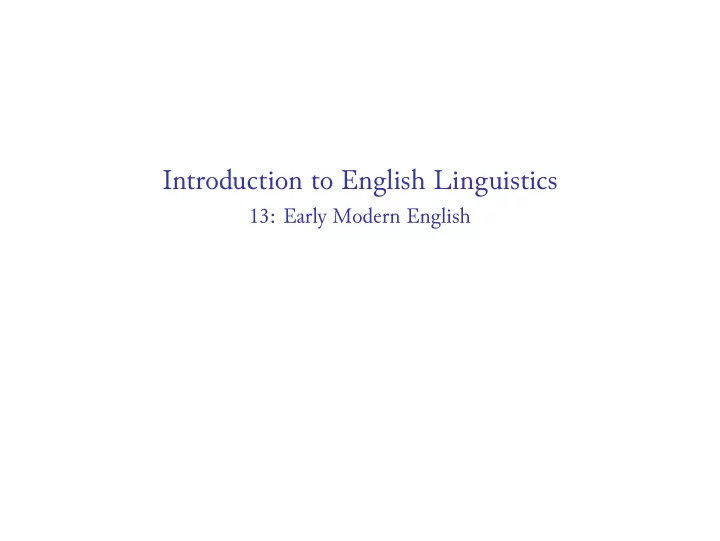

Introduction to English Linguistics 13: Early Modern English
Sociopolitical Context Rise of lay literacy in the lower classes Rise of political engagement in the lower classes Rise of nationalism Cultural Context Renaissance, Reformation, Enlightenment ▶ Return to classical texts and languages ▶ Encouragement of lay education ▶ Scientific advances ▶ Religious polemics
Cultural Context Renaissance, Reformation, Enlightenment ▶ Return to classical texts and languages ▶ Encouragement of lay education ▶ Scientific advances ▶ Religious polemics Sociopolitical Context ▶ Rise of lay literacy in the lower classes ▶ Rise of political engagement in the lower classes ▶ Rise of nationalism
Inflectional Loss Verbs OE ME eMnE hȳran hēren hear wē hȳraþ wē hēren we hear þæt wē hȳren þat wē hēren that we hear Nominals OE ME eMnE þā dagas þē daies the days þāra daga of þē daies of the days on þǣm dagum in þē daies in the days
(Strong) Verbs OE Present OE Past eMnE Present eMnE Past 1sg ic gefe ic geaf I give I gave 2sg þū gifest þū gēafe thou givest thou gavest 3sg hēo gifeþ hēo geaf she giveth she gave pl wē gefaþ wē gēafon we give we gave
Nouns Sg OE ME MnE Nom. stān stōn(e) stone Acc. stān stōn(e) stone Gen. stānes stōnes stone’s Dat. stāne stōn(e) stone Pl OE ME MnE Nom. stānas stōnes stones Acc. stānas stōnes stones Gen. stāna stōnes stones’ Dat. stānum stōnes stones
The Great Vowel Shifu (c. 1350–c. 1700)
The Great Vowel Shifu (c. 1350–c. 1700) Leaving out intermediary stages: 1. /uː/ diphthongized to /aʊ/: /huːs/ > /haʊs/ ▶ Consequent raisings: ▶ /oː/ > /uː/: /foːde/ > /fuːd/ ▶ /ɔː/ with diphthongization to /oʊ, əʊ/: /hɔːm/ > /həʊm/ 2. /iː/ diphthongized to /aɪ/: /wriːten/ > /raɪt/ ▶ Consequent raisings: ▶ /eː/ > /iː/: /reːden/ > /riːd/ ▶ /ɛː/ > /eː/: /mɛːtə/ > /meːte/ (now /miːt/) ▶ /aː/ > /eɪ/: /makan/ > /meɪk/
Word Order The servant seeketh the king
Do as a Dummy Auxiliary OE Hē hȳrþ Hyrst þū? Þū ne hyrst ME He hereth Herest thou? Thou herest nat eMnE He heareth / Hearest thou? / Thou hearest not / He doth heare Dost thou heare? Thou dost not heare PDE He hears Do you hear? You do not hear Achieved widespread use in eMnE; today survives in ▶ Interrogative clauses ▶ Negated clauses ▶ Emphatic assertions
Do : Progressive Aspect Abraham Do you bite your thumb at us, sir? Sampson I do bite my thumb, sir. Abraham Do you bite your thumb at us, sir? Sampson [Aside] Is the law of our side, if I say ay? Gregory No. Sampson No, sir, I do not bite my thumb at you, sir, but I bite my thumb, sir. Gregory Do you quarrel, sir? Abraham Qvarrel sir! no, sir. Sampson If you do, sir, I am for you: I serve as good a man as you. ( Romeo and Juliet , act 1 scene 1)
Lexicon c. 650–c. 1150 Old English 3% c. 1150–c. 1300 Early Middle English 8.5% c. 1300–c. 1500 Late Middle English 21.2% c. 1500–c. 1700 Early Modern English 45% c. 1700–today Present-Day English 70+% Table: Loanwords as a Percentage of Total Lexicon
Inkhorn Terms ▶ “Needless” new borrowings, esp. fsom Greek and Latin ▶ Sparked a backlash, leading some writers to seek Germanic alternatives ▶ Controversy fsom mid-16th to mid-17th century ▶ Cf. now every language borrowing fsom English
The 1611 Authorized Version or King James Version of the Bible ▶ Translation committee convened by King James ▶ Became the standard in the Church of England ▶ Became the most-printed work in the world ▶ Uses a lexicon of c. 7,000 words ▶ Today’s printings use modernized spelling
The 1611 Authorized or King James Bible Psalm 1 1. Blessed is the man that walketh not in the counsell of the vngodly, nor standeth in the way of sinners nor sitteth in the seat of the scornefull. 2. But his delight is in the Law of the Lord, and in his Law doeth he meditate day and night. 3. And he shal be like a tree planted by the riuers of water, that bringeth foorth his fsuit in his season, his leafe also shall not wither, and whatsoeuer he doeth, shall prosper. 4. The vngodly are not so: but are like the chaffe, which the winde driueth away. 5. Therefore the vngodly shall not stand in the iudgement, nor sinners in the Congregation of the righteous 6. For the Lord knoweth the way of the righteous but the way of the vngodly shall perish.
Early Modern English To the Reader This Figure, that thou here seest put, It was for gentle Shakespeare cut; Wherein the Grauer had a strife with Nature, to out-doo the life: O, could he but haue drawne his wit As well in brasse, as he hath hit His face; the Print would then sur- passe All, that was euer writ in brasse. But, since he cannot, Reader, looke Figure: Engraving fsom the Not on his Picture, but his Booke. 1623 edition of Shakespeare’s Plays
From The Tempest (act 1 scene 2) Miranda: If by your Art (my deerest father) you haue Put the wild waters in this Rore; alay them: The skye it seemes would powre down stinking pitch, But that the Sea, mounting to th’ welkins cheeke, Dashes the fire out. Oh! I haue suffered With those that I saw suffer: A braue vessell (Who had no doubt some noble creature in her) Dash’d all to peeces: O the cry did knocke Against my very heart: poore soules, they perish’d. Had I byn any God of power, I would Haue suncke the Sea within the Earth, or ere It should the good Ship so haue swallow’d, and The fsaughting Soules within her.
Recommend
More recommend